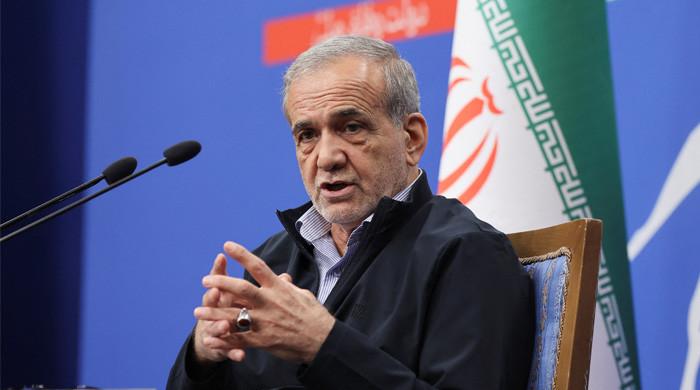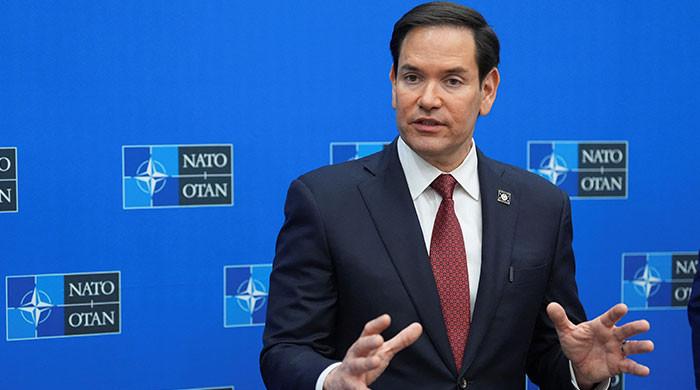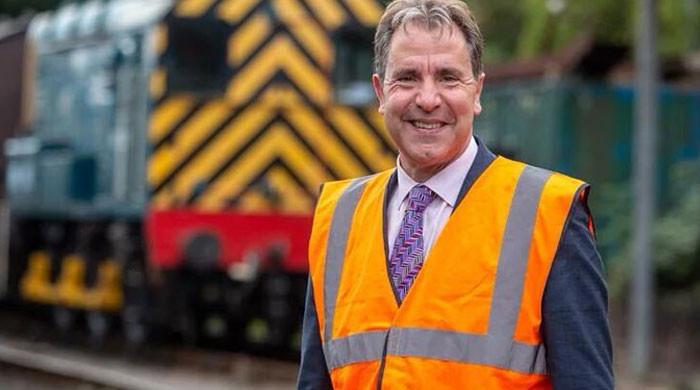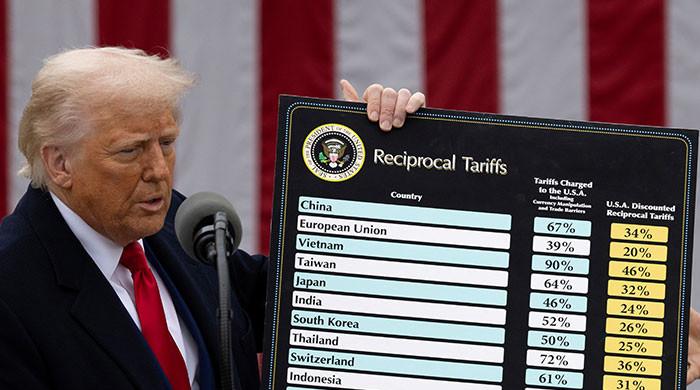US, Taliban sign 'peace deal' as Afghanistan looks for end to 18-year war
Intra-Afghanistan negotiations will begin after the agreement; Pakistan thanked for its role in facilitating the peace deal
February 29, 2020
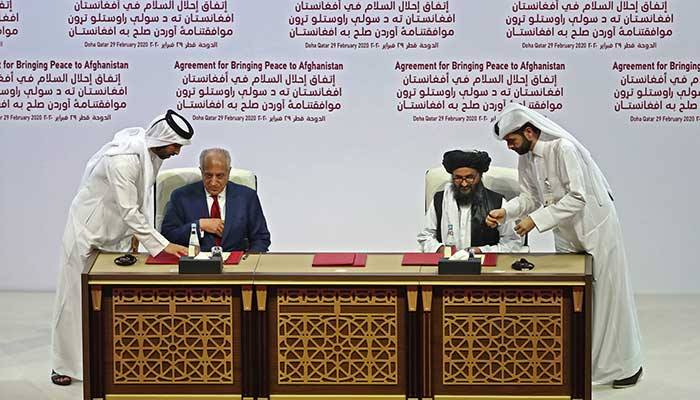
DOHA: Senior officials of the US government and the Afghan Taliban congregated in Doha, Qatar on Saturday to oversee the signing of a landmark peace deal between America and the Taliban.
The ceremony for the occasion started at around 5:45pm (PST), with world leaders present to see through an agreement that will see America withdraw its troops from Afghanistan after 18 years of war.
**
The deal envisions:
A guarantee to prevent the use of Afghan soil by any international terrorist groups or individuals against the security of the United States and its allies;
Provision of a timeline for the withdrawal of all US and coalition forces from Afghanistan;
A political settlement resulting from intra-Afghan dialogue and negotiations between the Taliban and an inclusive negotiating team of the Islamic Republic of Afghanistan; and
A permanent and comprehensive ceasefire.
**
If you remain committed, we are with you: Pompeo
In a joint statement issued on behalf of the US and the Afghan government, it was announced that American forces would withdraw completely from Afghanistan in 14 months, conditional on the Taliban upholding their end of the deal.
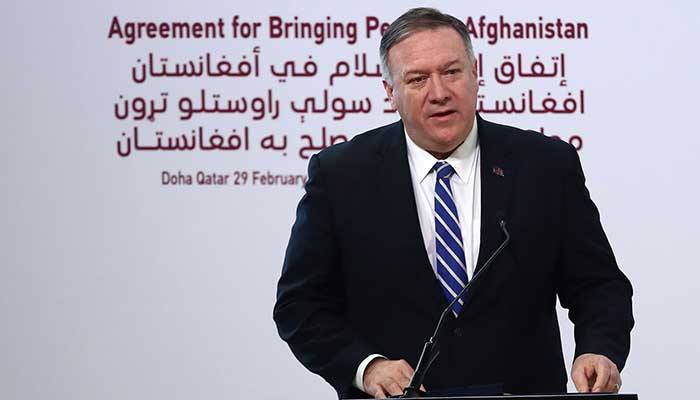
Pompeo noted that the US and the Taliban had agreed to end a long-winded conflict.
"We have endured decades of hostility; previous talks have faltered. The agreement we will sign today is a true testament of our actions," he said, thanking the emir of Qatar for his assistance in the negotiations.
"Violence levels [in Afghanistan] have reaced the lowest point in the last 40 years. The Taliban have demonstrated that when they have the will to be peaceful, they can be," Pompeo said.
"We are just at the beginning — furthering the cause of peace will require sacrifice by all sides. This agreement will not mean anything if we do not take concrete action on the promises made today.
"Keep your promises to cut ties with Al Qaeda; keep up the fight to defeat ISIS. All Afghans deserve to live and prosper without fear. The Afghanistan of 2020 is not the same as the Afghanistan of 2001. If you remain committed to negotiations with the Afghan government, we and the international community will reciprocate," he said.
Want to thank Pakistan for their role: Mullah Baradar
"The agreement is good for the nation of Afghanistan and the international community. I congratulate everyone," Taliban leader Mullah Abdul Ghani Baradar said, speaking after Pompeo.
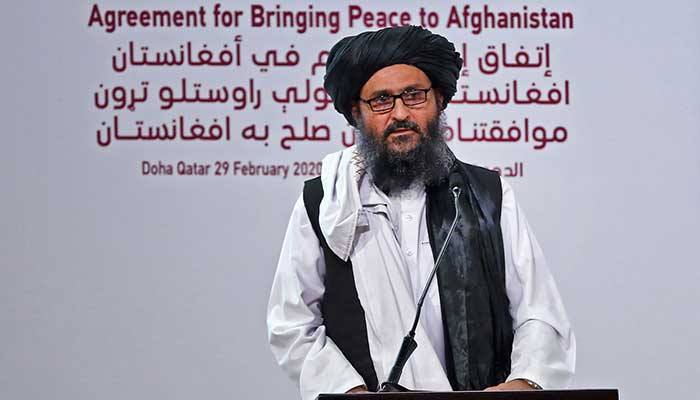
"We want a positive relationship with all. We are committed to enforce this agreement and we want, as a political force, to maintain positive relationships with our neighbours and the regional and international community.
"The Afghan nation has been suffering for the past four decades and we hope that with the withdrawal of foreign forces from Afghanistan, the nation will embark on a new and prosperous life.
"We all want unity and prosperity of our nation. I call on all Afghan factions to honestly and sincerely — for the establishment of a strong Islamic system — come to the negotiations," he urged.
"I would like to thank the Pakistanis for their work and assistance for this peace. I will also like to thank China, Uzbekistan, Russia, Iran and other countries who supported the peace process. I hope that they will participate in the rebuilding of Afghanistan," he concluded.
"Peace and blessings be upon you all."
Agreement inked
US Special Representative for Afghanistan Reconciliation Zalmay Khalilzad signed the treaty on behalf of the US, while Mullah Baradar signed on behalf of the Taliban.
The signing ceremony was witnessed by leaders of 30 countries, including Pakistan, Turkey, the UK, Germany, Russia and Iran. Foreign Minister Shah Mehmood Qureshi represented Pakistan.
A six-member group of representatives of the Afghan government who are currently in Doha did not attend, as the Taliban objected to their presence at the ceremony.
The Taliban had stressed that the treaty is between the Islamic Emirate of Afghanistan (represented by the Taliban) and the US.
Doubts need to be addressed
Speaking on the occasion, Qureshi said: "A new era will start if the peace agreement is implemented intelligently. [But] we have to see how the mistrust can be addressed.
"If the doubts are not addressed, then we will lose this important chance," he cautioned.
Need to agree to a fair and transparent process: Ghani
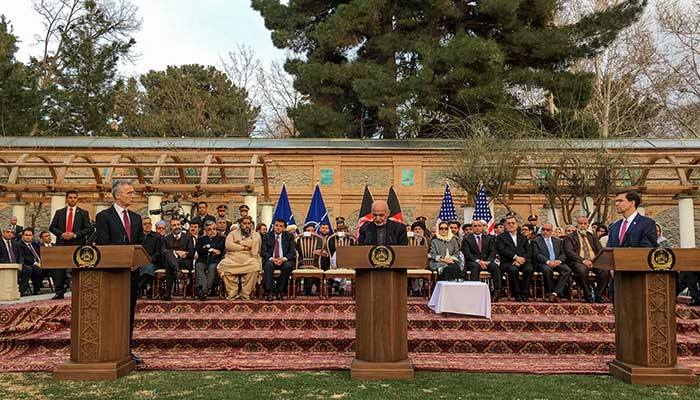
As the ceremony began in Doha, Afghan President Ashraf Ghani addressed a press conference in Kabul alongside US Defence Secretary Mark Esper to express hopes that the Doha peace deal between the Taliban and the United States will lead to an enduring peace between his government and the Taliban.
Ghani welcomed the deal's condition to launch an intra-Afghan dialogue after the agreement and said that all sides should honour peace, stating that "we, together with Taliban, should respect this holy wish of our nation".
The Afghan president said that he had raised the demand for the exit of foreign troops as around 94% of the security operations in Afghanistan were being conducted by the Afghan national forces.
Ghani thanked the NATO countries and the US government for their technical and financial assistance. He called on all present at the press conference to observe a one-minute silence for the lives lost in the conflict.
He said that the government and people of Afghanistan agreed with its international partners that there was a need for a political solution with the Taliban.
The Afghan president said that evidence of the resilience of the Afghan society was that out of the 10 million displaced persons, four million had returned to the country.
Ghani also paid tribute to Afghanistan's Ulema for backing the peace agreement with the Afghan Taliban.
US ´will not hesitate to nullify´ agreement if deal broken
The US "will not hesitate to nullify" its historic deal with the Taliban if they renege on their security guarantees and commitment to hold talks with the Afghan government, US Defense Secretary Mark Esper said on Saturday.
His comments came as the US signed the accord with the Taliban in Doha.
Esper, who was in Kabul, warned that "should the Taliban fail to honour their commitments, they will forfeit their chance to sit with fellow Afghans and deliberate on the future of their country."
"Moreover, the United States would not hesitate to nullify the agreement," he warned.
'We hope peace returns to Afghanistan'
Earlier, speaking to Geo News, Taliban representative Abdus Salam Zaeef said it had taken 20 years for this historic day.
"It is a good day," he said.
Zaeef hoped that peace will return to Afghanistan, saying that the agreement will guarantee a future for the country.
"Foreign forces will finally leave Afghanistan," he said.
FM Qureshi meets Khalilzad
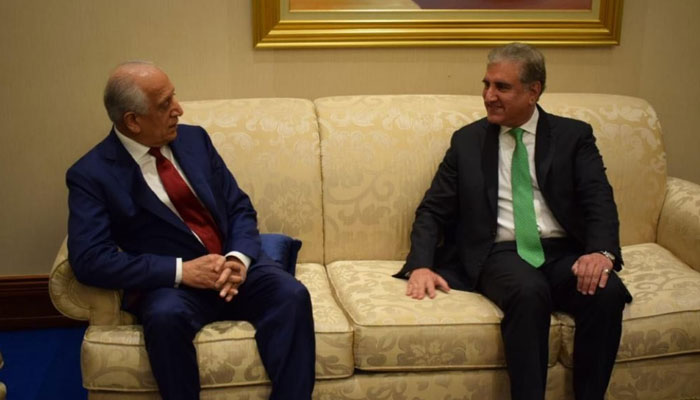
Earlier the same day, FM Qureshi met United States Special Representative for Afghanistan Zalmay Khalilzad.
Khalilzad apprised FM Qureshi of the situation arising from the possible signing of the deal, which will see America end one the longest-running wars it has ever been involved in.
"Pakistan hopes for intra-Afghan dialogue after the peace deal is signed," FM Qureshi said while meeting Khalilzad.
"The international community needs to help rebuild and develop the war-tron country," the foreign minister added in his comments to the US representative.
Challenges await as peace deal is signed
Today’s peace agreement will be followed by the resolution of more serious challenges; how to move forward in Afghanistan after the US withdraws from the country.
A few days ago, Pompeo had stated that intra-Afghan negotiations would begin after the agreement, which envisions US troops pulling out of the country and a permanent ceasefire.
Also read: Qureshi to represent Pakistan at signing of US-Taliban peace deal in Doha
The agreement is an important step towards peace not only in Afghanistan but also in neighbouring Pakistan.
Stumbling blocks
Islamabad has been using its good offices to ensure that the Taliban and Washington chalk out a future political roadmap for Afghanistan.
The negotiations had hit a wall in September 2019 when a US soldier was killed by the Taliban in Afghanistan.
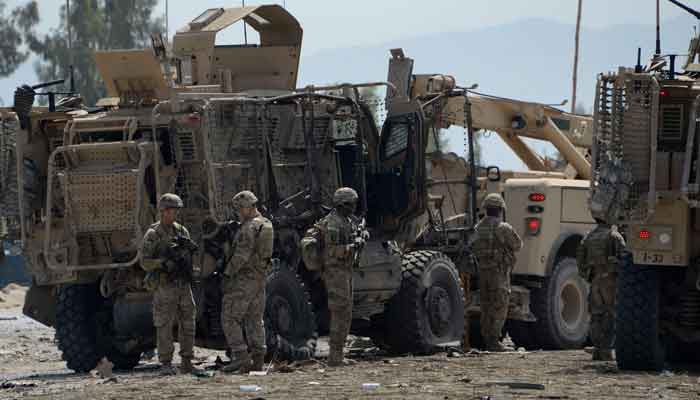
The death of the US soldier resulted in Trump abruptly called off the peace talks that were to be held with the Taliban at Camp David. The US insisted that the Taliban reduce violence completely before any talk of peace agreement with the US could be entertained.
Pakistan was instrumental in getting the Taliban and the US to talk again in November 2019 and finally, in February 2020, Pompeo announced a peace agreement would be signed on February 29, 2020.
Also read: US-Taliban agreement to benefit Pakistan, Afghanistan and entire region: FM
A path forward?
After a mutually agreed seven-day reduction in violence, both sides had agreed to sign the deal, which will be followed by an announcement of a timeline for the complete withdrawal of American troops from the country.
According to Foreign Affairs, at the moment there are 12,000 to 13,000 American troops currently stationed in Afghanistan.
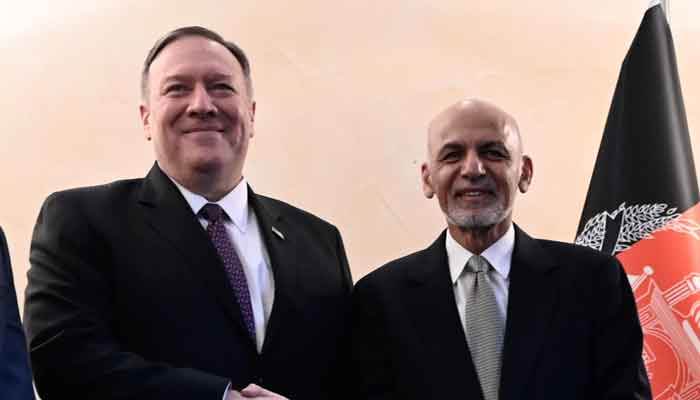
Also read: Doha deal: Trump wants Afghans to 'seize opportunity for peace'
However, there is no guarantee that the withdrawal of US troops from the country would go as expected. For starters, there is fear that the withdrawal of US troops from the country could once again allow a terrorist threat to grow.
Moreover, the Taliban are openly against the current constitution of the country. Anything which puts the country back to the 1990s would likely be unacceptable to the Ashraf Ghani-led government and the United States.
What’s in it for Pakistan?
The 18-year-old conflict has had disastrous implications for Pakistan. Militancy took root in the country in the aftermath of the September 11, 2001 attacks and the subsequent US invasion of Afghanistan.
Frequent terrorist attacks and suicide bombings hampered the country’s economic prospects. More than 70,000 Pakistanis, according to Prime Minister Imran Khan, have died because of the War on Terror.
Pakistan’s security institutions are well aware that India’s influence in Afghanistan will be curtailed after a political power-sharing deal with the Taliban is reached in the restive country.
Also read: US Secy Pompeo highlights 'significant reduction' in violence in Afghanistan
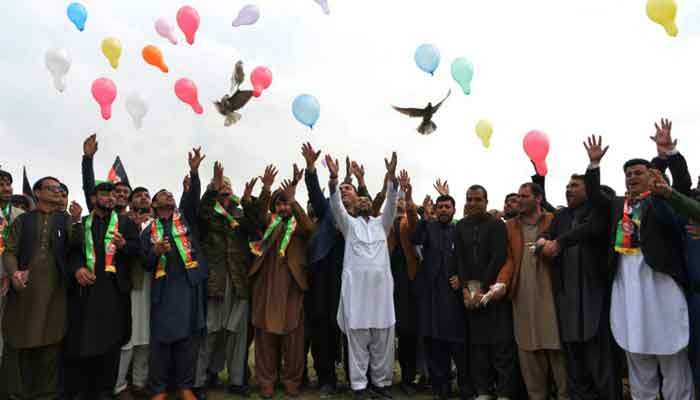
For long, Pakistan has blamed India for collaborating with the Afghan intelligence agencies to conduct attacks in Pakistan. Hence, peace in Afghanistan with the Taliban back in some power-sharing arrangement will constrain Indian influence to a great deal in the country and also, in the region.
Lastly, Pakistan is housing millions of Afghan refugees that it wishes will return to their home country when peace prevails.
Trump wants Afghans to 'seize opportunity for peace'
President Donald Trump on Friday urged the Afghan people to embrace a chance for a new future.
With a one-week ceasefire set as a condition for the pact holding firm, Trump said that there is now a possibility of ending the nearly two-decade war in Afghanistan.
He announced he was sending Pompeo to witness the signing of the treaty, and that Defense Secretary Mark Esper would separately issue a joint declaration with the Kabul government.
Also read: Citizens from Gulf countries barred from entering holy cities over coronavirus fears
The commitments to be made in the Taliban agreement and the joint declaration are an "important step to a lasting peace" that could free Afghans from the threat of Al Qaeda and the Daesh group, Trump said in a statement.
"If the Taliban and the government of Afghanistan live up to these commitments, we will have a powerful path forward to end the war in Afghanistan and bring our troops home," he said.
"Ultimately it will be up to the people of Afghanistan to work out their future. We, therefore, urge the Afghan people to seize this opportunity for peace and a new future for their country," he added.








